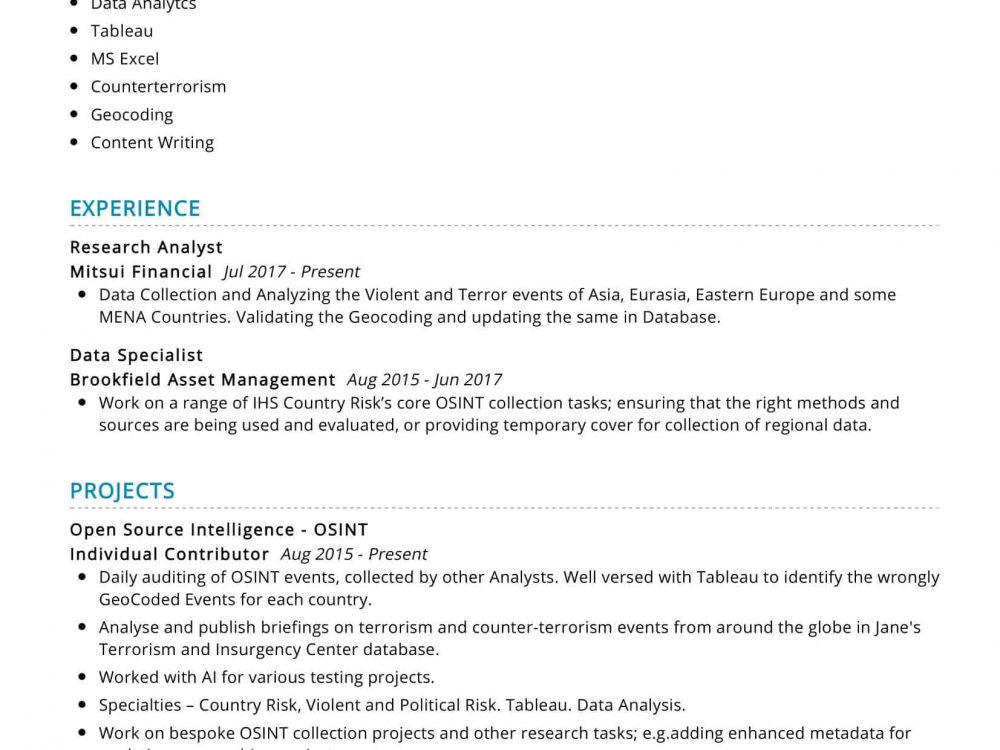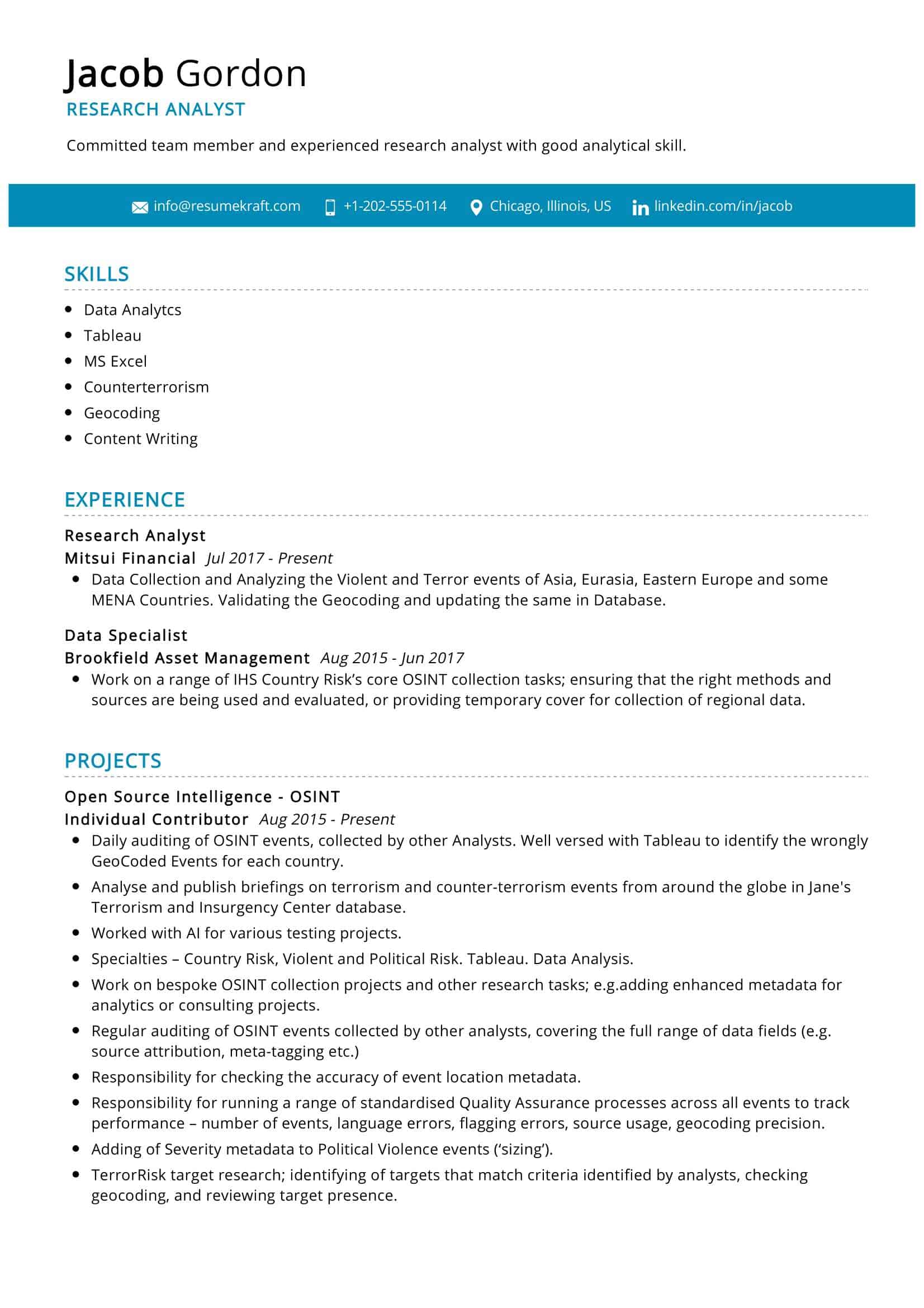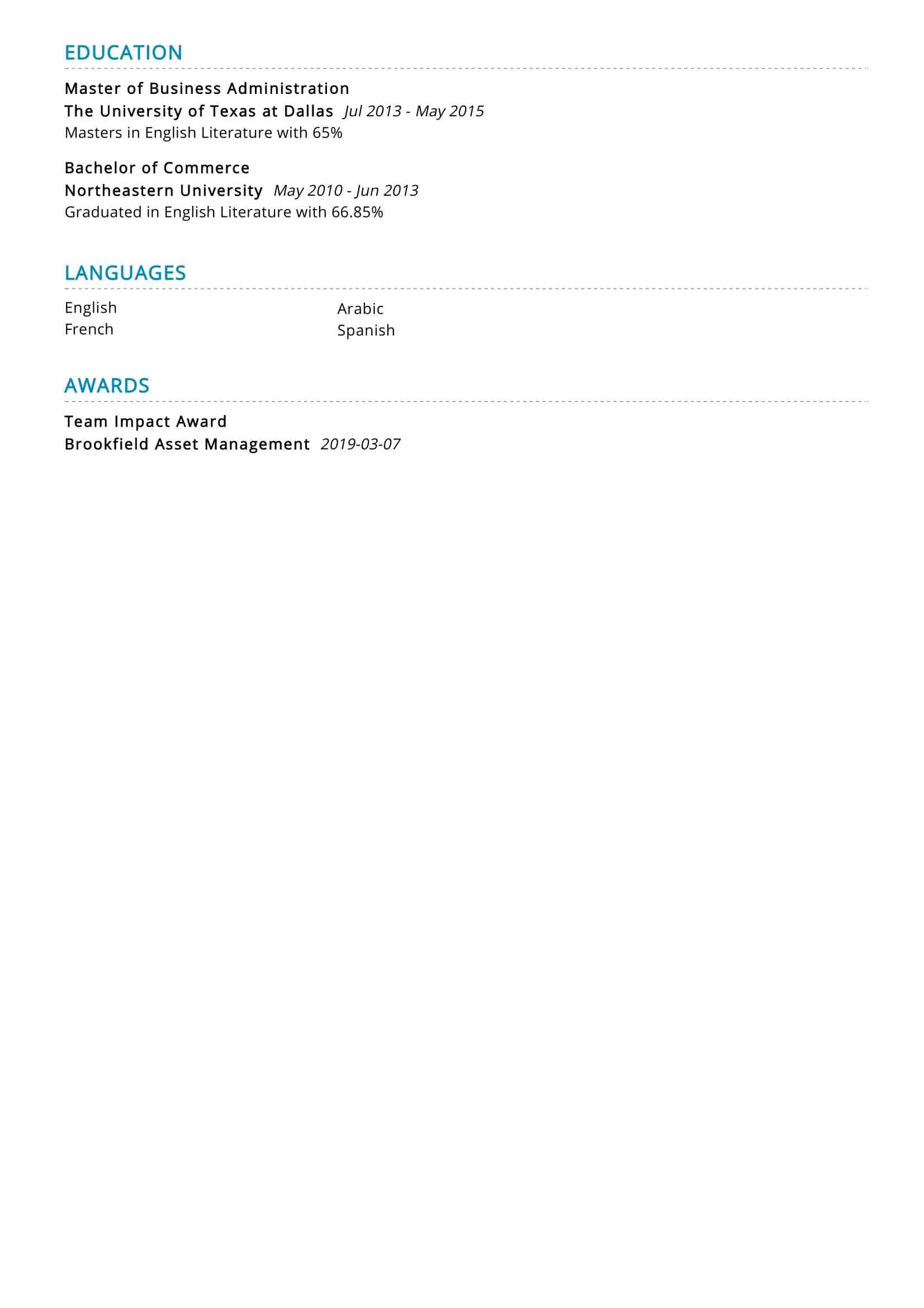Are you a Research Analyst by profession and looking for an exciting career? We have good news for you! use our professional Research Analyst Resume Sample. You don’t have to start writing from scratch. Just click “Edit Resume” and modify it with your details. Update the template fonts and colors have the best chance of landing your dream job. Find more resume samples.
Research Analyst Resume Sample
Jacob Gordon
Research Analyst
Summary
Committed team member and experienced research analyst with good analytical skill.
Skills
Work Experience
Research Analyst
Mitsui Financial
Data Collection and Analyzing the Violent and Terror events of Asia, Eurasia, Eastern Europe and some MENA Countries. Validating the Geocoding and updating the same in Database.
Data Specialist
Brookfield Asset Management
Work on a range of IHS Country Risk’s core OSINT collection tasks; ensuring that the right methods and sources are being used and evaluated, or providing temporary cover for collection of regional data.
Education
Master of Business Administration
The University of Texas at Dallas
Bachelor of Commerce
Northeastern University
Projects
Open Source Intelligence – OSINT
Individual Contributor
- Daily auditing of OSINT events, collected by other Analysts. Well versed with Tableau to identify the wrongly GeoCoded Events for each country.
- Analyse and publish briefings on terrorism and counter-terrorism events from around the globe in Jane’s Terrorism and Insurgency Center database.
- Worked with AI for various testing projects.
- Specialties – Country Risk, Violent and Political Risk. Tableau. Data Analysis.
- Work on bespoke OSINT collection projects and other research tasks; e.g.adding enhanced metadata for analytics or consulting projects.
- Regular auditing of OSINT events collected by other analysts, covering the full range of data fields (e.g. source attribution, meta-tagging etc.)
- Responsibility for checking the accuracy of event location metadata.
- Responsibility for running a range of standardized Quality Assurance processes across all events to track performance – number of events, language errors, flagging errors, source usage, geocoding precision.
- Adding of Severity metadata to Political Violence events (‘sizing’).
- TerrorRisk target research; identifying of targets that match criteria identified by analysts, checking geocoding, and reviewing target presence.
Languages
- French
- English
- German
- Chines
Career Expert Tips:
- Always make sure you choose the perfect resume format to suit your professional experience.
- Ensure that you know how to write a resume in a way that highlights your competencies.
- Check the expert curated popular good CV and resume examples
Research Analyst Resume with Writing Guide
Love problem solving? Want to do research that matters for a living? Then you may be well suited to this career path! Read on for more information about the Research Analyst profession, such as salary and common positions. Hopefully this article will help you clarify what Research Analysts really do.
Types of Research Analysts:
Business Research Analysts (BRA): Business research analysts are often multi-disciplinary, working with subject matter experts in their specialty area. They may report up to a manager, but they often work as part of a team or on their own. Therefore, they are considered “self-starters” and “can-do” people. They use analytic tools like spreadsheets, databases and micro-tasks to sort and analyze information.
Research Analyst Resume Writing Guide:
Research Analyst Resume – Statement of Skills:
What job skills and experience do you have that make you a great Research Analyst? If you are a Business Research Analyst who is interested in changing from the “data analyst” job title, it is important that you use your skills to indicate your level of skill in each of these areas. Start by identifying 1 or 2 skills that are most important to the job and list them at the top of the resume.
Research Analyst Resume – Experience:
Having the right experience is essential if you are a Business Research Analyst, and you want to be able to show that you have been successful in the career path. Keep in mind that most “one-stop shops” (recruiters) are looking for data analysts that have the experience of working with other people and other departments in a company.
Research Analyst Resume – Education:
Here is where you can address how you acquired the skills that are important to the job. You may choose to list your work experience or your education if you want to focus on the specific skills that are important to the position. It is a good idea to put computer and math skills at the top of the resume and then address other areas in terms of years of experience.
Research Analyst Resume – Skills Summary:
Even if you have a very thorough skills section on your resume, it is always a good idea to include a summary of your skills. If you are just submitting an application and resume to an employer, then this summary can go at the top of the resume. This is also the place to include your job objective statement if you are in a position to do so without sounding pushy.
Research Analyst Resume – Contact Information:
If you are applying for a position directly to an employer, this is the place for your contact information. You want to include your phone number, email address and address in this section. You can also include your LinkedIn profile and name at the bottom of the resume. It is important that you do not include information about your personal or professional affiliations on your resume. The last thing you would want is a recruiter contacting a university professor or member of your church parish to get more information about you.
List of Typical Responsibilities For a Research Analyst Resume:
- Research and analyze useful information about your target audience.
- Construct a comprehensive list of possible job opportunities, demonstrating that your skills are relevant to the marketplace demand.
- Research the job demand and marketability of a variety of different potential employers, showing examples of past job experience or key skills involved in research.
- Build up a strong, professional resume that highlights your relevant skills as well as professional accomplishments and accomplishments that displays your abilities to meet the demands of a position in current or future positions with the same employer.
- Create a list of accomplishments that clearly demonstrate your ability to perform as a research analyst.
- Research public or private sources to gather the data needed for this job, such as researching the data base of an organization to obtain information about potential job openings and analyzing current trends for possible applications.
- Interview potential employers concerning their hiring needs, and compile a list of questions for employers that will help you gain insight into their needs and determine if you would be a good fit in the organization
- Research and analyze market sales to identify new items that may be lucrative or predict the most popular items in a given area, including research to determine the nature of any market slump.
- Consult with company officials to determine which projects are in need of funding and then develop a budget for each project that includes estimated costs if any and potential returns.
- Research options and resources for funding each project, including identifying possible bank loans, venture capitalists or other sources of financing.
Top 10 Must-have Research Analyst Skills:
- Market and industry research: Conducts research to understand the market for a product.
- Business research: Conducts marketing research to help a company set its pricing, advertising strategy, and develop products.
- Online marketing research: Conducts Internet-based surveys, Web site traffic analysis, and other forms of online marketing research to help companies meet their business goals.
- Public opinion research: Conducts surveys and polls to understand the attitudes and opinions of a group or population.
- Social Media Marketing: Developer and coordinator for social media sites such as blogs, Twitter feeds, Facebook pages, etc.
- Script writing: Writes scripts that guide call center agents to promote positive customer experience using social media outlets like Twitter, Facebook, etc., on behalf of a company or organization.
- Research skills: Has the ability to comprehend complex information quickly.
Tips to write a Research Analyst Resume Summary:
- Personalize Your Resume: Each resume should be specially created for you and your strengths. It is not a good resume to copy from someone else’s resume, because it probably does not fit your personal profile.
- Tailor to the Job Description: Look at the job description carefully and write an interesting summary of what fits best with the job description. Do not include irrelevant information such as hobbies, volunteer projects, or unrelated skills in the summary unless they are relevant to what is being described in the job description. Relevant information is often found in the last few lines of the job description. It is best to add information on your resume that describes specifically how you meet the criteria described in the job. The summary section of your resume should be a short description of what makes you the best candidate for this particular job.
- Skills and Abilities: The most important skills and abilities to describe are those that are most relevant to the job described in the job description.
How to write a Research Analyst Resume with No experience:
- Do not lie about anything! If you have No experience, show it instead of talking about it.
- Start with a strong objective statement, preferably in the first line.
- Remove all personal details (address, email address, phone number) and substitute them with industry-related details that demonstrate your knowledge and capabilities in the field in which you are applying for jobs.
- Prepare a cover letter explaining why you are applying for this job with details about your qualifications. Note that companies require specific information from candidates such as education, previous position, experience and more.
- Follow the company’s directions for formatting your resume and cover letter.
- Send your resume and cover letter to the hiring manager or recruiter in the usual email format.
- Follow up every two weeks with a call to the appropriate person to ask about your application.
- Be persistent, but not annoying or you may never get an interview!
How to write a Research Analyst Cover Letter:
- Location & format. When sending your resume and cover letter out, be sure to send it to the correct location. Sending your cover letter and resume to the incorrect location often results in someone else receiving credit for your hard work. Stay organized and make sure you know who you have sent the documents to.
- Formatting. Don’t make your resume so long that no one wants to read it, or too short that they don’t get a full picture of your experience and qualifications. It is best to keep your resume to a page in length or less.
- Content. The content of your cover letter should be clean, concise, and professional. Cover letters are your way of introducing yourself and setting yourself apart from the competition. Without it you almost are guaranteed not to receive a response from the company you are applying for.
- Contact information. Make sure your contact information is clearly visible. Include your name, address, phone number and email address at the top of your resume and cover letter.
- Evidence of your achievements:
Make sure you include evidence of your achievements in each experience or qualification section. Employers want to see what you have accomplished with each position you have held in previous jobs; they don’t want to be left guessing what you are really capable of when it comes to performing a certain task or completing a specific project.
Key Takeaways:
- Research Analysts are responsible for collecting and compiling information about potential investments.
- Research analysts work a variety of odd hours so be sure to highlight your ability to adapt and to clearly specify when you’re available to work.
- A well-written resume provides insight into your character, personality and professional capabilities which can determine whether you make it through the first round of interviews.



